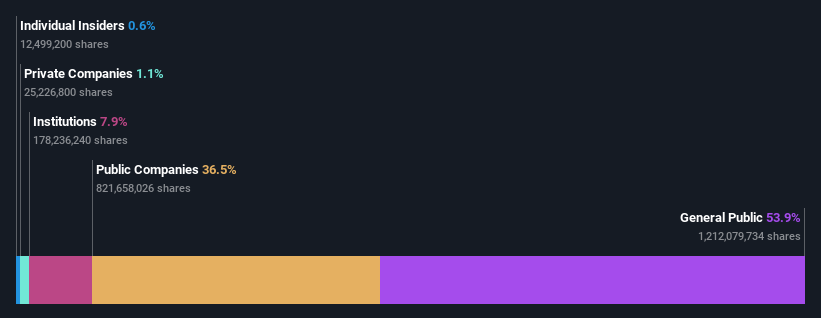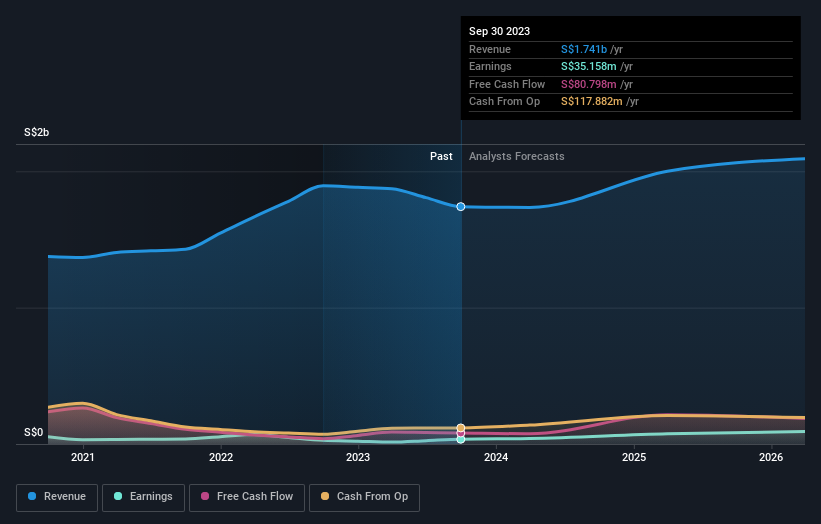Retail investors account for 54% of Singapore Post Limited's (SGX:S08) ownership, while public companies account for 37%
Key Insights
The considerable ownership by retail investors in Singapore Post indicates that they collectively have a greater say in management and business strategy
The top 25 shareholders own 46% of the company
Using data from company's past performance alongside ownership research, one can better assess the future performance of a company
A look at the shareholders of Singapore Post Limited (SGX:S08) can tell us which group is most powerful. With 54% stake, retail investors possess the maximum shares in the company. Put another way, the group faces the maximum upside potential (or downside risk).
Public companies, on the other hand, account for 37% of the company's stockholders.
Let's take a closer look to see what the different types of shareholders can tell us about Singapore Post.
View our latest analysis for Singapore Post
What Does The Institutional Ownership Tell Us About Singapore Post?
Institutional investors commonly compare their own returns to the returns of a commonly followed index. So they generally do consider buying larger companies that are included in the relevant benchmark index.
Singapore Post already has institutions on the share registry. Indeed, they own a respectable stake in the company. This implies the analysts working for those institutions have looked at the stock and they like it. But just like anyone else, they could be wrong. When multiple institutions own a stock, there's always a risk that they are in a 'crowded trade'. When such a trade goes wrong, multiple parties may compete to sell stock fast. This risk is higher in a company without a history of growth. You can see Singapore Post's historic earnings and revenue below, but keep in mind there's always more to the story.
Singapore Post is not owned by hedge funds. Our data shows that Singapore Telecommunications Limited is the largest shareholder with 22% of shares outstanding. With 15% and 2.3% of the shares outstanding respectively, Alibaba Group Holding Limited and The Vanguard Group, Inc. are the second and third largest shareholders.
A deeper look at our ownership data shows that the top 25 shareholders collectively hold less than half of the register, suggesting a large group of small holders where no single shareholder has a majority.
While studying institutional ownership for a company can add value to your research, it is also a good practice to research analyst recommendations to get a deeper understand of a stock's expected performance. There is some analyst coverage of the stock, but it could still become more well known, with time.
Insider Ownership Of Singapore Post
The definition of company insiders can be subjective and does vary between jurisdictions. Our data reflects individual insiders, capturing board members at the very least. Company management run the business, but the CEO will answer to the board, even if he or she is a member of it.
I generally consider insider ownership to be a good thing. However, on some occasions it makes it more difficult for other shareholders to hold the board accountable for decisions.
Our data suggests that insiders own under 1% of Singapore Post Limited in their own names. We do note, however, it is possible insiders have an indirect interest through a private company or other corporate structure. It seems the board members have no more than S$4.8m worth of shares in the S$866m company. We generally like to see a board more invested. However it might be worth checking if those insiders have been buying.
General Public Ownership
The general public, mostly comprising of individual investors, collectively holds 54% of Singapore Post shares. This level of ownership gives investors from the wider public some power to sway key policy decisions such as board composition, executive compensation, and the dividend payout ratio.
Public Company Ownership
It appears to us that public companies own 37% of Singapore Post. This may be a strategic interest and the two companies may have related business interests. It could be that they have de-merged. This holding is probably worth investigating further.
Next Steps:
I find it very interesting to look at who exactly owns a company. But to truly gain insight, we need to consider other information, too. Consider for instance, the ever-present spectre of investment risk. We've identified 1 warning sign with Singapore Post , and understanding them should be part of your investment process.
But ultimately it is the future, not the past, that will determine how well the owners of this business will do. Therefore we think it advisable to take a look at this free report showing whether analysts are predicting a brighter future.
NB: Figures in this article are calculated using data from the last twelve months, which refer to the 12-month period ending on the last date of the month the financial statement is dated. This may not be consistent with full year annual report figures.
Have feedback on this article? Concerned about the content? Get in touch with us directly. Alternatively, email editorial-team (at) simplywallst.com.
This article by Simply Wall St is general in nature. We provide commentary based on historical data and analyst forecasts only using an unbiased methodology and our articles are not intended to be financial advice. It does not constitute a recommendation to buy or sell any stock, and does not take account of your objectives, or your financial situation. We aim to bring you long-term focused analysis driven by fundamental data. Note that our analysis may not factor in the latest price-sensitive company announcements or qualitative material. Simply Wall St has no position in any stocks mentioned.

 Yahoo Finance
Yahoo Finance 

